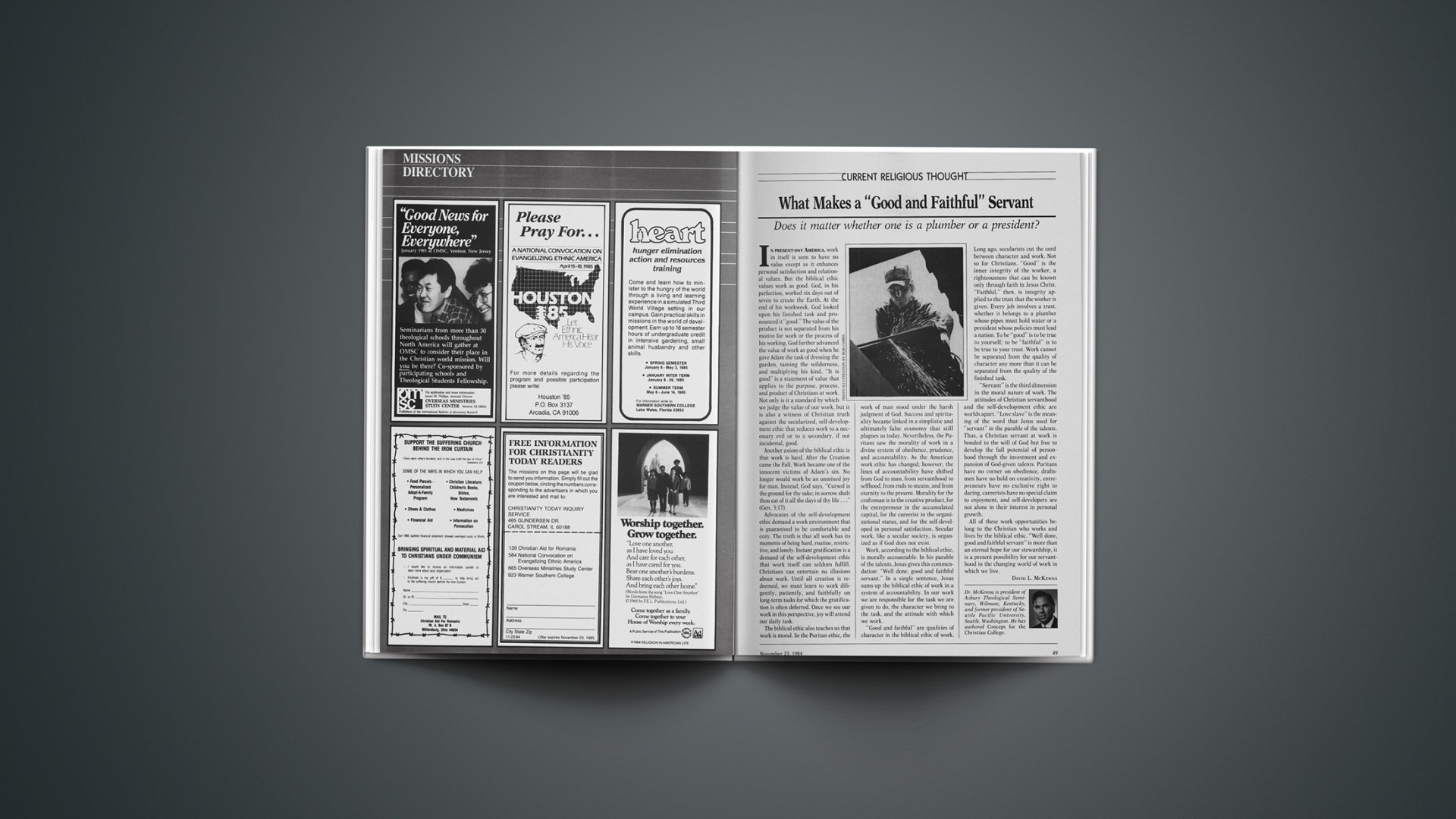Does it matter whether one is a plumber or a president?
In present-day America, Work in itself is seen to have no value except as it enhances personal satisfaction and relational values. But the biblical ethic values work as good. God, in his perfection, worked six days out of seven to create the Earth. At the end of his workweek, God looked upon his finished task and pronounced it “good.” The value of the product is not separated from his motive for work or the process of his working. God further advanced the value of work as good when he gave Adam the task of dressing the garden, taming the wilderness, and multiplying his kind. “It is good” is a statement of value that applies to the purpose, process, and product of Christians at work. Not only is it a standard by which we judge the value of our work, but it is also a witness of Christian truth against the secularized, self-development ethic that reduces work to a necessary evil or to a secondary, if not incidental, good.
Another axiom of the biblical ethic is that work is hard. After the Creation came the Fall. Work became one of the innocent victims of Adam’s sin. No longer would work be an unmixed joy for man. Instead, God says, “Cursed is the ground for thy sake; in sorrow shalt thou eat of it all the days of thy life …” (Gen. 3:17).
Advocates of the self-development ethic demand a work environment that is guaranteed to be comfortable and cozy. The truth is that all work has its moments of being hard, routine, restrictive, and lonely. Instant gratification is a demand of the self-development ethic that work itself can seldom fulfill. Christians can entertain no illusions about work. Until all creation is redeemed, we must learn to work diligently, patiently, and faithfully on long-term tasks for which the gratification is often deferred. Once we see our work in this perspective, joy will attend our daily task.
The biblical ethic also teaches us that work is moral. In the Puritan ethic, the work of man stood under the harsh judgment of God. Success and spirituality became linked in a simplistic and ultimately false economy that still plagues us today. Nevertheless, the Puritans saw the morality of work in a divine system of obedience, prudence, and accountability. As the American work ethic has changed, however, the lines of accountability have shifted from God to man, from servanthood to selfhood, from ends to means, and from eternity to the present. Morality for the craftsman is in the creative product, for the entrepreneur in the accumulated capital, for the careerist in the organizational status, and for the self-developed in personal satisfaction. Secular work, like a secular society, is organized as if God does not exist.
Work, according to the biblical ethic, is morally accountable. In his parable of the talents, Jesus gives this commendation: “Well done, good and faithful servant.” In a single sentence, Jesus sums up the biblical ethic of work in a system of accountability. In our work we are responsible for the task we are given to do, the character we bring to the task, and the attitude with which we work.
“Good and faithful” are qualities of character in the biblical ethic of work. Long ago, secularists cut the cord between character and work. Not so for Christians. “Good” is the inner integrity of the worker, a righteousness that can be known only through faith in Jesus Christ. “Faithful,” then, is integrity applied to the trust that the worker is given. Every job involves a trust, whether it belongs to a plumber whose pipes must hold water or a president whose policies must lead a nation. To be “good” is to be true to yourself; to be “faithful” is to be true to your trust. Work cannot be separated from the quality of character any more than it can be separated from the quality of the finished task.
“Servant” is the third dimension in the moral nature of work. The attitudes of Christian servanthood and the self-development ethic are worlds apart. “Love slave” is the meaning of the word that Jesus used for “servant” in the parable of the talents. Thus, a Christian servant at work is bonded to the will of God but free to develop the full potential of personhood through the investment and expansion of God-given talents. Puritans have no corner on obedience, draftsmen have no hold on creativity, entrepreneurs have no exclusive right to daring, careerists have no special claim to enjoyment, and self-developers are not alone in their interest in personal growth.
All of these work opportunities belong to the Christian who works and lives by the biblical ethic. “Well done, good and faithful servant” is more than an eternal hope for our stewardship, it is a present possibility for our servanthood in the changing world of work in which we live.
Dr. McKenna is president of Asbury Theological Seminary, Wilmore, Kentucky, and former president of Seattle Pacific University, Seattle, Washington. He has authored Concept for the Christian College.










